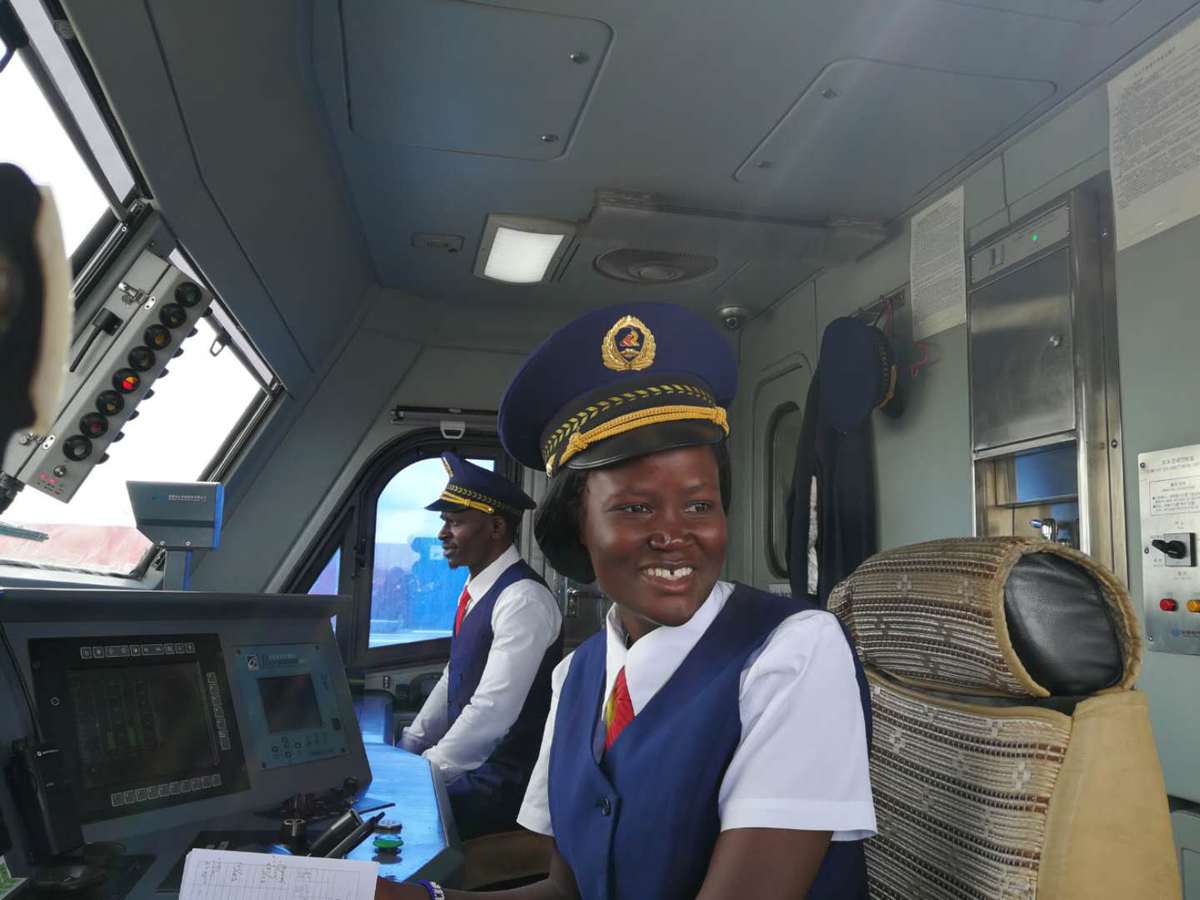A growing number of Kenyan youth is reaping the benefits of the human capital development programme implemented under the Forum on China-Africa Cooperation (FOCAC). The initiative has seen an increase in the number of locals who, besides employment, receive training and skills from overseas Chinese companies establishing operations in Africa. This is changing the life trajectory of ordinary people.
Concilia Owire, a young Kenyan, is one of them and is a testament to the progressive impact of this programme. She proves that training and education significantly enhance opportunities for young people by equipping them with relevant skills.
Owire is a renowned Kenyan woman, the first one to drive a locomotive at Afristar Railway Operation Company that runs the country’s Standard Gauge Railway project. She became a train driver thanks to a Chinese company, China Road and Bridge Corporation (CRBC).
The 29-year-old lady who hails from the Western Kenya region, an area near the border with Uganda says, growing up, she always wanted to be a train driver, a longing sparked by the constant sight of trains that operated along the old meter gauge railway that cut through her village.
“I would always get a glimpse of this long train even though it was not very eye-catching from the physical appearance to the operational speed and I could always see that the drivers were men,” she said
She soon realized that no train was operated by a woman and this deeply troubled her. Upon inquiries, Owire was told women shied away from driving trains because they operated for long hours. She was even more dispirited when she heard that women stood less chance of securing employment in the rail transport sector compared to their male counterparts. This made Owire give up on that dream and instead pursue Electrical Engineering.
But as fate would have it, and in an interesting turn of events, an opportunity that would take her back to railway operations came knocking in 2016, almost a decade after giving up her childhood dream. She was offered a scholarship by CRBC to study Locomotive & Rolling Stock Engineering in China. This was at a time when Kenya’s Standard Gauge Railway line between Mombasa and Nairobi was being constructed.
“I started checking out this new technology that Kenya was starting to embrace, that was going to eliminate the barriers that made me give up on my childhood dream. I grabbed the opportunity and I decided I would be the first Kenyan female locomotive driver, and drive the train beyond Kenyan borders,” she said noting that the chance filled her heart with excitement.
She would learn about locomotive principles, layout, electrical appliances, and the brake system.
“Not only did this opportunity grant me a door for technology transfer but also to learn about a new culture, the Chinese culture, which is a very diverse culture that have had the pleasure to learn and indulge in,” she adds
After a series of months of theoretical training in China, she started practical lessons which helped her master the operation of all rail cars.
“The train was transporting about 70 wagons, and when my Chinese instructor told me to sit and start moving the handles, that scared the hell out of me. I was like how am I going to drive a train this long and also being in a foreign country,” she said while narrating her story last year during celebrations to mark 60 years of China-Kenya diplomatic relations.
However, with time, with the help of her Chinese instructors, and after many lessons, Owire says the apprehension disappeared and confidence kicked in.
“My instructor used to tell me “Ni keyi zuo dao” meaning “you can do it.” I gathered all the courage to start moving the handles and after a very long intensive training period, my operation improved,”
The conclusion of her training coincided with the completion of SGR construction. And she had to come back home. But what awaited her was something she couldn’t have imagined.
Owing to her qualifications, she had been selected to be the main driver of Madaraka Express’ maiden trip from Mombasa to Nairobi with former President Uhuru Kenyatta and his deputy then (now President) William Ruto on board.
“When I was appointed to drive the train, I was so happy, yet so nervous, because my desire to be the first Kenyan female locomotive driver was dependent on it and every Kenyan was looking forward to seeing the operation structure of this new technology,” said Owire who was 23 years old
“It was a lot of pressure but I endured it because I knew this was my moment. When I stopped the train safely at Nairobi terminus a few minutes past seven, I cried. I knew I did it. I made myself proud. My country and my instructors were proud of me. That moment will always be engraved in my heart forever,” recounted Owire
She has been operating the SGR trains since 2017, both the passenger and freight trains and she says the rides give her the same excitement she got the first time she commandeered the train. She looks back with joy, full of appreciation to the Chinese for giving her a life-changing opportunity.
The opportunity, according to Owire, is the greatest thing that happened to her life.
“I stand here today as one of the many Kenyans who have benefited from technology transfer from China, with personal achievements like being the first Kenyan female locomotive driver, being the only Kenyan who has independently operated over 140,000km, and being honored at the United Nations in 2022 as an epitome of women empowerment. I am proud of myself, and I am grateful for my instructors who made it possible,” she says
Owire says many young girls in Kenya look at her as a role model. She says she will forever serve as a railway ambassador showcasing the benefits of the modern railway, with a focus on the benefits it has brought to Kenya, making the country East Africa’s transport hub.
Owire is now among 11 other Kenyans who have been issued with qualification certificates, becoming the first group of Kenya’s SGR locomotive drivers, who steer the trains independently without the help of the Chinese.





